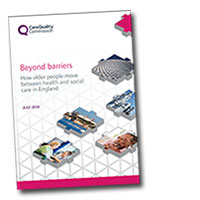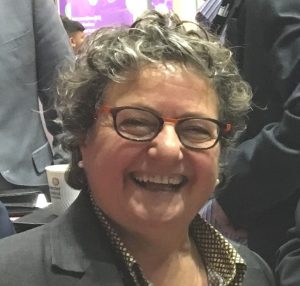 As life expectancy increases, so too does the number of people living with long-term and complex conditions. Meeting their needs has become a challenge in recent years, with many relying on a wide range of different services to receive the right care.
As life expectancy increases, so too does the number of people living with long-term and complex conditions. Meeting their needs has become a challenge in recent years, with many relying on a wide range of different services to receive the right care.
In her debut blog for this site, Lorraine Foley, Chief Executive of the Professional Record Standards Body (PRSB), examines the findings of the Care Quality Commission (CQC)'s recently published report 'Beyond barriers'. The report explores how older people move between health and adult social care services in England. Lorraine finds that its recommendations chime with much of the PRSB's own aims and values...

Following the completion of 20 local authority area reviews, ‘Beyond barriers’ considers the challenges facing the different services involved. While the report shows the positive ways that organisations are trying to work together, it also highlights the lack of a shared plan or vision, which has resulted in people not getting the right care, in the right place, at the right time.
As well as increasing expense and increasing demand on services, in some cases safety and quality of care can be compromised, for example, by keeping a patient in the wrong environment for too long.
Elderly people and those with complex care needs tend to have more emergency and crisis situations, leading to hospital admissions. Between September 2016 and September 2017 there were 380,000 A&E attendances from people living in care homes and around 270,000 hospital admissions.
 Timely discharge summaries are essential to making sure people receive good continued care, but this information isn’t always communicated. According to the CQC report, only half of the residential care homes who responded received discharge summaries most (75-100 percent) of the time, while 60 percent of domiciliary care services received the summary less than 25 percent of time.
Timely discharge summaries are essential to making sure people receive good continued care, but this information isn’t always communicated. According to the CQC report, only half of the residential care homes who responded received discharge summaries most (75-100 percent) of the time, while 60 percent of domiciliary care services received the summary less than 25 percent of time.
Lyn Romeo, the Chief Social Worker for Adults in England, agrees that clear and consistent information sharing is vital – especially when a range of services are involved:

"Transfers of care are nearly always complex operations, so coordinating the expertise of multiple health and care professionals requires structure and focus. Discharge summaries must be clear, comprehensive and consistent, but above all – shared!
"Social workers are at their best when they combine person-centred approaches with the collective professional understanding of a person’s needs, desires and aspirations. Any process which makes the sharing of information easier and unambiguous is to be welcomed. I applaud the PRSB and CQC’s continued efforts to make this so."
Last year, we also found major variation in the information being shared with care homes in one of our surveys. Of 260 care home managers, we found that care home workers needed better handovers, better planning by hospitals ahead of discharge, higher quality discharge summary information and appropriate discharge times for their service users.
We also found that 27 percent of care homes received no summary, while 90 percent of those who do get them still receive paper records which can’t be amended or returned. Around two-thirds of those interviewed said they had their own digital processes in place, but these would not be compatible with GP or hospital systems, which supports the case for standardised records that can be shared between all systems.
The issue has been recognised by NHS Digital, and the organisation is currently developing digital products and services to ensure care homes can receive e-discharge summaries. Using existing technologies (such as the NHS email service) care homes will have access to timely information about residents after a hospital discharge, meaning they are better able to provide the right care.
The CQC has made some helpful and wide ranging recommendations to support the future of health and care. Standardised information sharing underpins all of this work, by enabling better integrated working.
Access to standardised shared records for all those involved in care - including the person themselves - will mean that we are able to better action these changes and see real developments, working towards a more integrated health and care system for future generations.
Looking ahead, I hope that new legislation allows the CQC to regulate systems and hold them to account, enabling us to see long-term improvements to health and care for those living with long-term conditions.
1 comment
Comment by Ann WILKINSON posted on
Increase tax for everyone who earns enough to pay tax. Ring fence a social care savings plan for everyone. No good leaving it and starting to pay at forty, a tax for everyone will mean when people need it there will be enough funds to pay for care.
Do not take people's homes to pay for them including those who never work as they get more in benefits.